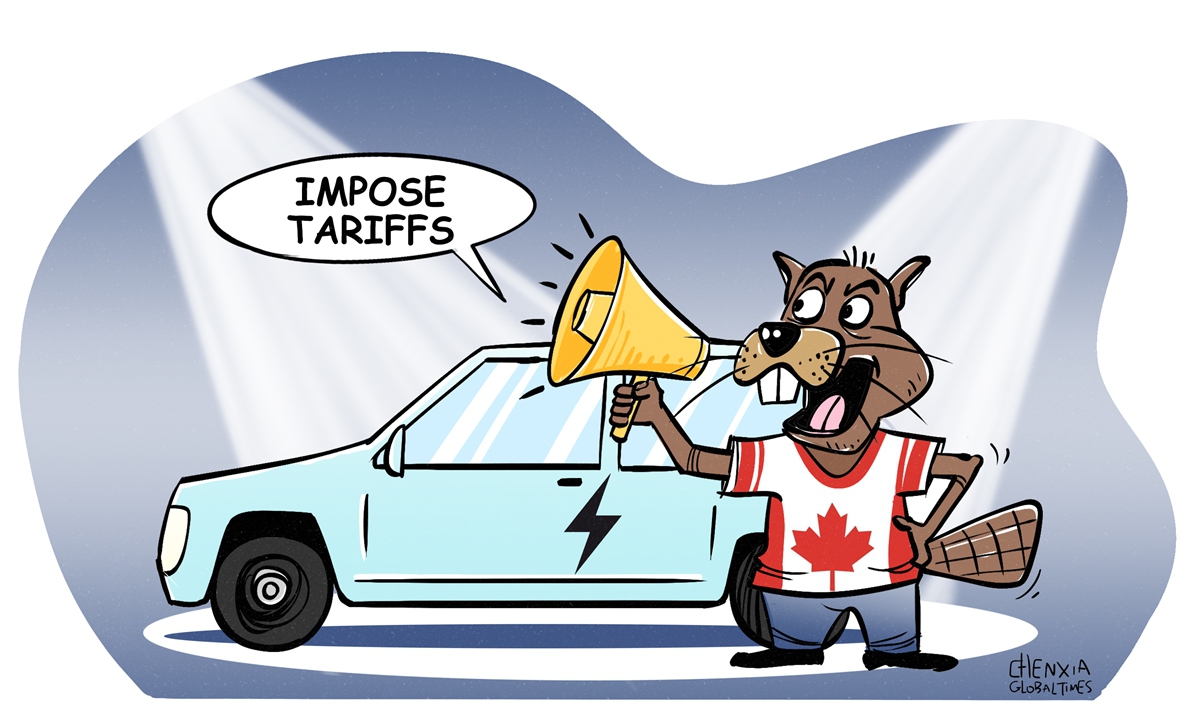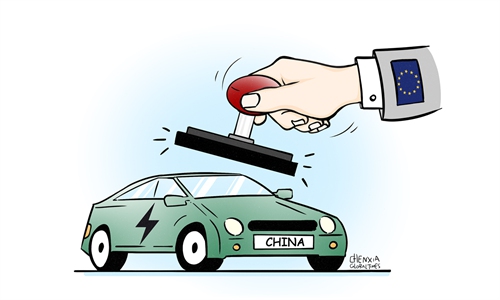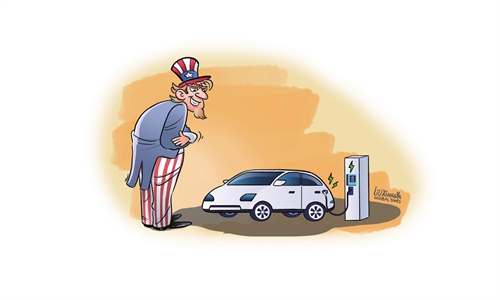
Illustration: Chen Xia/GT
With an ambitious zero-emission vehicle sales target, Canada needs to face up to the competitiveness of Chinese electric vehicles (EVs) and is advised to value and encourage the participation of Chinese EV makers, rather than erecting trade barriers that dampen their enthusiasm for the Canadian market.Chinese EV maker BYD is looking to enter the Canadian automotive market, Reuters reported on Tuesday, citing a regulatory document filed recently.
Separately, according to a report by Automotive News, BYD recently hired lobbyists to advise it on entering the Canadian market to sell passenger EVs, establishing a new business and responding to the possible imposition of EV tariffs.
As China's leading EV manufacturer, BYD's plan to enter the Canadian market showcases its confidence and optimism toward this market. Although Canadian officials are considering imposing tariffs on EVs imported from China, BYD's efforts indicate that it believes the Canadian market has promising growth potential and business opportunities.
This confidence may stem from Canada's heightened emphasis on environmental protection, its ambitious 100 percent EV sales target and rising demand for EVs.
It is no secret that Canada is committed to achieving 100 percent zero-emission vehicle sales by 2035, including interim targets of at least 20 percent by 2026 and at least 60 percent by 2030, as announced in Canada's 2030 Emissions Reduction Plan.
But carmakers in Canada appear doubtful about the targets. According to a Bloomberg report in June, executives at Toyota Motor Corp and Honda Motor Co expect that consumers will switch to EVs if they are more affordable, meet their range needs and are supported by sufficient charging infrastructure. But those conditions haven't been met. Under such circumstances, BYD's entry could be paramount for Canada to achieve the target.
It would be regrettable if Canada were to replicate the US decision to impose new tariffs on EVs imported from China without considering the potential long-term benefits.
Given Canada's close relationship with the US, it is understandable that much of Canada's economic and trade policy has come under pressure to align with that of the US. But is it necessary for Ottawa to do it on all aspects and at the expense of its own economic interests?
For a country where the consumer market for EVs is still developing, putting up trade barriers will mean higher EV prices, increasing the economic burden of consumers and curbing consumer demand for and acceptance of green vehicles.
The US is a prime example. Demand for EVs in the US has grown more slowly than expected, according to media reports. Relatively high costs and insufficient charging facilities have impeded the growth of the US EV market, leading to multiple automakers scaling back production plans. This is a clear illustration of the detrimental effects that protectionism has had on the domestic industry.
Moreover, the protectionist approach conflicts with Ottawa's high hopes for the development of the EV industry. The Canadian government has signed agreements with automakers such as Honda Motor and Volkswagen to make EVs, batteries or components in Ontario, Canada's most populous province.
Some may believe that imposing new tariffs on Chinese EVs may prompt Chinese automakers to invest in Canada, instead of just selling cars. However, the problem is that the political implications behind the potential new tariffs could be magnified, which would be sufficient to weaken investment confidence among Chinese automakers.
If Canada were to follow the protectionist path of the US in the EV sector, it should carefully examine the problems facing the American EV market and be prepared to accept the even worse consequences of replicating American protectionist practices.
China strongly opposes trade protectionism. If Canada continues to erect barriers, it will ultimately harm its own interests. China will protect the legitimate rights and interests of Chinese companies.
Canada's ambitions for EV development are in line with the global trend toward sustainable transportation solutions. In this context, despite geopolitical undercurrents, it is crucial for Ottawa to remain strategically rational and keep an open mindset when it comes to formulating relevant trade policies, so as to avoid restricting natural competition and undermining Canada's appeal as a promising market.
Thanks to the collaborative efforts, China-Canada economic and trade relations are progressing steadily. It is imperative that we continue to enhance our cooperation, not backslide it.



